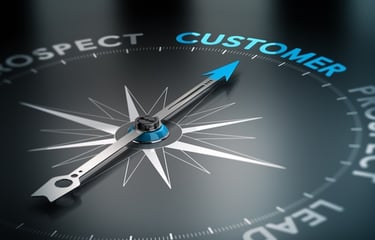
The term Inbound Marketing was invented by HubSpot, and is now part of the marketing landscape. In a nutshell its about attracting potential customers to you, as opposed to outbound interruptive marketing techniques.
Once engaged, through educational and thought leadership content, a key part of the inbound methodology is to provide further relevant information to potential customers to help them progress through to a closed deal.
This part of the methodology is not ground breaking! In the past, sales have always nurtured prospects with information and content at various stages of the sales cycle until they are closed as customers, so what has changed?
Well the buyers still need information at all stages of their journey before making a decision, but it is the buyer’s ability to access as much information as they like through the internet which is the major shift from the past. Buyers now have the upper hand they are no longer reliant on sales to provide information and can determine when they want to engage with sales,
So if sales don't get to speak to a potential customer until much later on, it means marketing need to step up to the plate and create relevant, thoughtful and valuable content to feed the buyers need for information and get engagement as soon as possible ... which is what Inbound Marketing is all about.
If sales are to get the quality and quantity of leads they need to make their revenue targets they need to collaborate and align themselves more closely with marketing, influencing content plans and making full use of the behavioural insight that marketing can provide about the lead using tools like HubSpot.
OK, so you may say that inbound is great for casting the net as wide as possible, drawing in leads to the top of the funnel, nurturing them until they are ready for sales and this is the way to go for smaller deals... mass marketing. It makes sense that you need content to do this, and social interaction to promote the content, and marketing needs to make sure sales have all the background information on a lead from visit to handover. You want a marketing automation tool to work hard for you to control the process, help you analyse what is working and keep the cost of customer acquisition down.
But what about strategic accounts? Selling into these mega accounts is all about relationships and selling to key buyers! What is the point of marketing being involved? After all, you have a small hot shot sales team who know how to engage and draw out the needs and sell them a solution, is there really a need for marketing to be involved at all with strategic accounts?
Short answer - YES marketing is relevant for strategic account selling! Buyers are in these strategic accounts don’t live in a ‘bubble’ and they have as much access to the same information as buyers in non-strategic accounts have. They will still seek out information about your company and products and references from sources other than the sales team. These buyers need to be nurtured with tailored and personalised content, delivered in the way that they choose, and when they do engage through the various channels, sales need to be notified on website visits and have insight as to what they are consuming.
If someone in a strategic account looks for proof, don't let them find your competitors' information before they find you! Keep a check on SEO for the keywords those buyers are using and ensure that there is content there to satisfy their needs.
In summary, then....where in the past, sales used to control the process and to an extent the information flow, it now needs full collaboration and alignment between sales and marketing to reach buyers with the right content at each stage of their journey to achieve revenue and growth targets. With inbound marketing you are casting a net, with Account Based Marketing this is done in a highly targeted way.
Account Based Marketing for strategic accounts is all about planning, hyper-targeting of different stakeholders and decision makers, very targeted content, and therefore there needs to be a really tight alignment between sales and marketing to ensure all the effort will pay off for what will be a really high cost per lead.
Top performing companies have really strong sales and marketing alignment, to find out more take a look at 5 key benefits of sales and marketing alignment ... especially for technology companies
.png?width=250&height=76&name=Intellegentia%20Logo%20(MAIN).png)